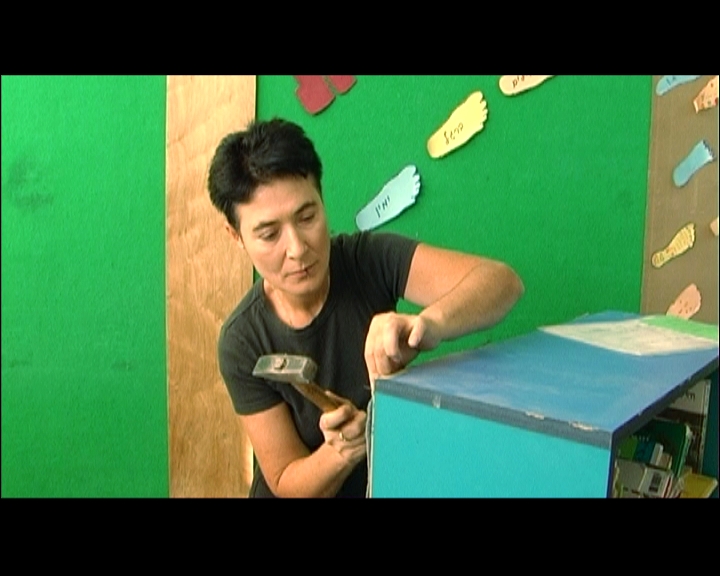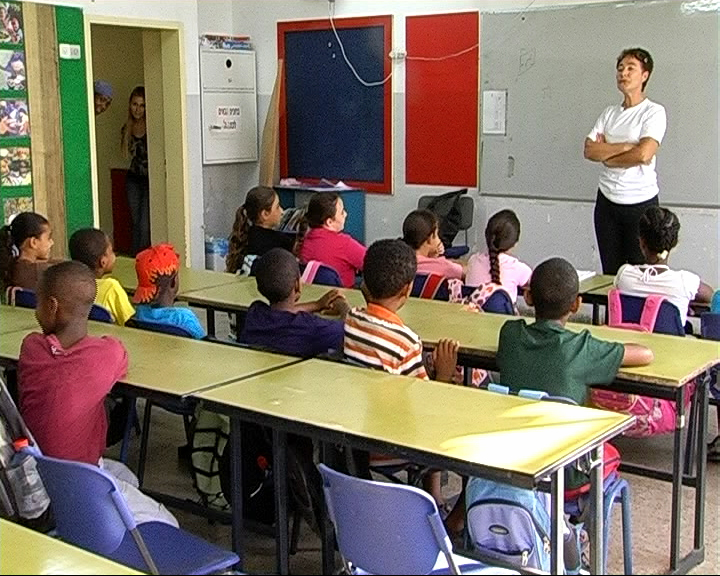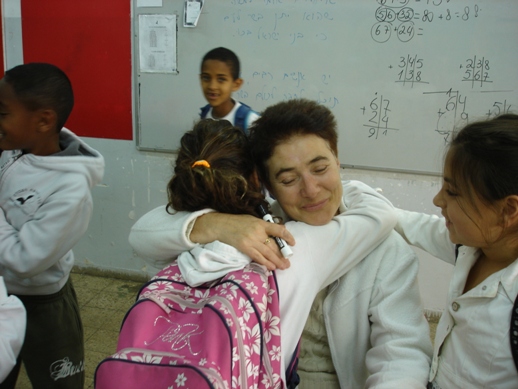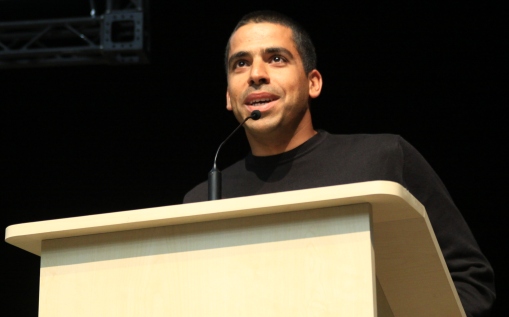The calendar year is coming to a close, the school year is well under way with the first round of parent-teacher conferences, and the days are growing shorter and colder. As we enter the winter season when darkness comes on all too soon, Teacher Irena is a source of light and warmth – not the warm gentle glow of a flickering candle flame, but the fire that burns in the belly.
A documentary feature that follows a teacher and her third grade class over the course of one school year, Teacher Irena opened the 2010 DocAviv Galil festival on November 29, 2010 in the new performing arts center in Maalot-Tarshiha. Directed by Itamar Chen, and produced by Saar Yogev and Naomi Levari, the film opened the 2010 DocAviv festival in May at the Tel Aviv Cinematheque, and Arik Lahav Leibovitch received the Best Editing Award for the film.
Irena, an immigrant from the Ukraine, her Hebrew strongly accented, teaches in the Katamon neighborhood. Her students come from families struggling for survival on a daily basis, facing a barrage of obstacles and challenges with limited means, their economic and emotional resources are soon depleted. The long apartment buildings, low cost housing built to accommodate waves of new immigrants in the 50s, are now home to immigrants from Ethiopia and the former Soviet Union, who came to Israel in the 1990s. Some of the children come from homes where the parents do not speak Hebrew, some are unemployed, others work long hours at low-paying jobs to make ends meet.

This is the class that Irena will meet on the first day of school, preceded by her own reputation – tough, demanding, with a hands-on approach to teaching. Hammer in hand, pounding nails into a bookcase, then taking up a drill – forceful, intent on her task, dark hair cut short, in T shirt and dark pants – this is Irena. No narration or explanations clutter this powerful, moving film. The means of production are rendered invisible, and the camera takes us straight to the heart of the classroom, creating a narrative with seamless transitions from one carefully selected shot to another, allowing Irena and the children to speak for themselves more eloquently than any outside observer.
Irena’s standards are high and she makes them clear from the start: backs straight, hands neatly folded on the desk, at first she seems a paragon of the legendary Russian discipline. But that is just the beginning. Working with children often defined as “at risk,” Irena takes risks. The daily reality of the children’s schooldays, home life and feelings is acknowledged, in all its gritty detail. When she tells them that she expects good behavior in school, she is not content with asking them to be “nice” to one another, she is unhesitatingly explicit: “No boys going into the girl’s bathroom and pulling down their pants, no spitting in someone else’s sandwich.”

Irena does not waste time on making things seem better than they really are, her energy is dedicated to helping the children make choices that can change their reality for the better. She is unflinchingly honest with the children, and encourages their candor as well. Some of these third graders either cannot read at all, many have difficulty reading, and they are still working on simple addition of two digit numbers. This is a classroom in which there are children whose families can’t afford books and supplies, and there is not a single parent willing to be a on the parent’s committee.
Irena tells the children, “don’t feel pressured, just put whatever you have on the desk,” and as for the parent’s committee, which usually organizes events, she will take charge of that as well. She attends to every detail of their day, going from child to child, checking to see if their pencils are sharpened; at lunch (which they eat in the classroom) each child has to show her the tray, so she can make sure that they have the nourishment they need. Irena asks one girl, “Why didn’t you eat your green beans?” When the girl responds, “I don’t like them,” Irena says, “Neither do I,” and gives the girl permission to go out to recess.
The norms of student-teacher relations presume a different set of circumstances than those of Irena and her students. The standard guidelines that make sense in a classroom of 25 well-fed and clothed children, who have their own desk in a home with books, with parents who have the ability to devote time, thought, energy and resources to all aspects of their education, don’t work in this context. For the most part, once you venture beyond the pristine halls of schools populated by the upper middle class, the system fails. It’s not at all clear what methods will succeed and most of the time the school system is stumbling around in the dark.

Irena brings passion and emotion into the classroom. I’m not talking about politically-correct conversations about “feelings” from a scripted syllabus. Her enthusiasm, hope, anger, and pain are always in full view. Irena is not the kind of teacher who will tell a student or parent “it will be all right” (like the ubiquitous mythic Israeli slang “yehiyeh beseder”) if it’s not, she won’t say that something is easy if it is hard, but she will not give up, she won’t let the children or their parents give up, and she will be there to help. Her energy and enthusiasm are astounding. Quizzing the children on math problems, she shows her delight in every correct answer – “You’re wonderful…you’re smart…I’m fainting,” telling the students: “I love the spark in your eyes.”
Neither is there any attempt by Irena or the film to hide the personal cost of this devotion to her students. A widow raising her eight year old son in a very modest (to say the least) rental apartment with leaky pipes, she freely admits that she has no family, no friends. Yet day after day in the classroom, she brings the impossible a step closer to the possible. When she asks the children what they would like to be when they grow up, one girl says that she would like to be an animal trainer in the circus. Some teachers might content themselves with an encouraging word or smile, but Irena gives the girl a serious look and tells her, “In order to train, you need to love. Everything begins with love.”

Itamar Chen, the film’s director was present at the screening to introduce the film. A graduate of the Sam Spiegel Film & Television School, Teacher Irena is Chen’s first documentary film. Chen told the audience that he is often asked why he chose to make this film about Irena, saying, “The story moved me, and I cherished a small hope that it would succeed in moving others and inspire other teachers and people.” Since the film’s premiere, Chen has heard from many for whom Irena has become a symbol of hope and inspiration, saying, “My wish has come true.”
Teacher Irena (Hamorah Irena, Israel 2010, 52 minutes Hebrew/Russian)
Director: Itamar Chen, Producers: Saar Yogev & Naomi Levari, Cinematographer: Yossi Aviram, Sound recording: Yishai Ilan, Oleg Kaiserman, Alfred Tesler, Production manager: Ra’anan Gershoni, Editor: Arik Lahav Leibovitz, Music: Ronnie Reshef, Soundtrack designer: Gil Toren, Script: Itamar Chen & Naomi Levari.






Congratulations, exelente set of documents, I confess that much it moves, tragetória of this brave woman, this history it fascinated me. It would like very to change correspondence with this teacher who she serves as example many others that they possess all exemptions e not they value. Brave, Bravissimo, Teacher Irena.
I love Ya
Roxanne Britho
from Brazil
I am Israeli. I have watched your movie few times, and loved it dearly. In a world where the politically correct, and no discipline are rulling, a teacher that uses everything she can to make it work is amazing.
I understand that you have to keep her last name off the record, but I live in Cleveland Ohio, where there is a large Israeli and Jewish population, and we would like to invite such an inspirational teacher to maybe come and visit our schools during the summer.
You can contact me through my e mail
Comments are closed.